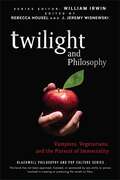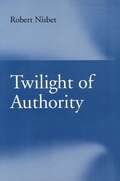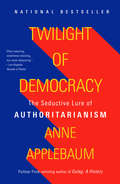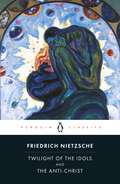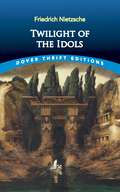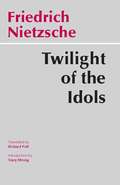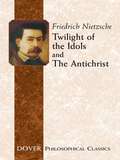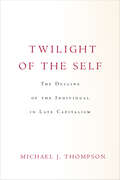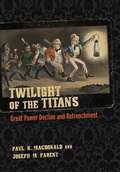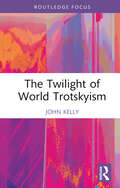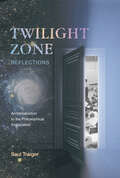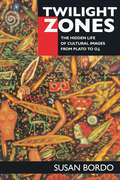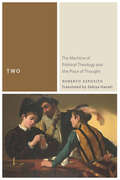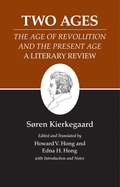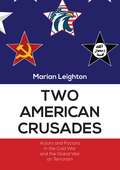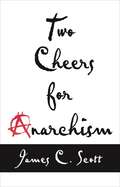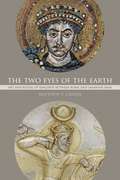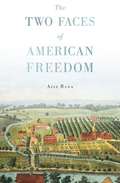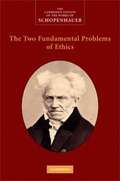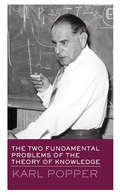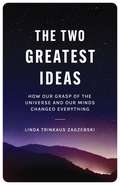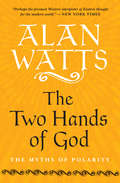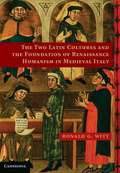- Table View
- List View
Twilight and Philosophy: Vampires, Vegetarians, and the Pursuit of Immortality (The Blackwell Philosophy and Pop Culture Series #15)
by William IrwinThe first look at the philosophy behind Stephenie Meyer's bestselling Twilight series Bella and Edward, and their family and friends, have faced countless dangers and philosophical dilemmas in Stephenie Meyer's Twilight novels. This book is the first to explore them, drawing on the wisdom of philosophical heavyweights to answer essential questions such as: What do the struggles of "vegetarian" vampires who control their biological urge for human blood say about free will? Are vampires morally absolved if they kill only animals and not people? From a feminist perspective, is Edward a romantic hero or is he just a stalker? Is Jacob "better" for Bella than Edward? As absorbing as the Meyer novels themselves, Twilight and Philosophy: Gives you a new perspective on Twilight characters, storylines, and themes Helps you gain fresh insights into the Twilight novels and movies Features an irresistible combination of vampires, romance, and philosophy Twilight and Philosophy is a must-have companion for every Twilight fan, whether you're new to the series or have followed it since the beginning.
Twilight of Authority
by Robert C. Perrin Robert NisbetWe had thought, or our forefathers had, that modern liberal democracy would be spared the kind of erosion and decay that both Plato and Aristotle declared endemic in all forms of state. Now we are not so sure. " So wrote Robert Nisbet in the first edition of Twilight of Authority, published by Oxford University Press in 1975, shortly after the resignation of President Richard Nixon revealed what Nisbet called "only the most extreme and corrupt manifestation of a democratic royalism that has roots in several preceding administrations. " Nisbet argues that the political community in the West has broken down after two centuries of ascendancy. He believes that the West has entered "a twilight age" that will be characterized by political and cultural crises similar to those that preceded the fall of Rome. He foresees the displacement of traditional, liberal society by centralized, collectivized power--what he terms "the war society," driven by the rising power and expense of a hugely scaled military. "The centralization, and, increasingly, individualization of power is matched in the social and cultural spheres by a combined hedonism and egalitarianism, each in its own way a reflection of the destructive impact of power on the hierarchy that is native to the social bond," he writes. Nisbet offers no prophecy of inevitable decline; rather, he means to call attention to "the problem of finding the means of generating a social order within which the individual can live and derive a spirit of initiative. " Robert Nisbet (1913-1996) was renowned worldwide for his scholarship in the history and philosophy of social and political thought. He taught at Columbia, the University of California at Berkeley, Smith College, and the University of Bologna, and was the author of several major works, including Social Change and History and The Quest for Community.
Twilight of Democracy: The Seductive Lure of Authoritarianism
by Anne ApplebaumA Pulitzer Prize–winning historian explains, with electrifying clarity, why elites in democracies around the world are turning toward nationalism and authoritarianism.From the United States and Britain to continental Europe and beyond, liberal democracy is under siege, while authoritarianism is on the rise. In Twilight of Democracy, Anne Applebaum, an award-winning historian of Soviet atrocities who was one of the first American journalists to raise an alarm about antidemocratic trends in the West, explains the lure of nationalism and autocracy. In this captivating essay, she contends that political systems with radically simple beliefs are inherently appealing, especially when they benefit the loyal to the exclusion of everyone else.Despotic leaders do not rule alone; they rely on political allies, bureaucrats, and media figures to pave their way and support their rule. The authoritarian and nationalist parties that have arisen within modern democracies offer new paths to wealth or power for their adherents. Applebaum describes many of the new advocates of illiberalism in countries around the world, showing how they use conspiracy theory, political polarization, social media, and even nostalgia to change their societies.Elegantly written and urgently argued, Twilight of Democracy is a brilliant dissection of a world-shaking shift and a stirring glimpse of the road back to democratic values.
Twilight of Idols and Anti-Christ
by Friedrich NietzscheIn these two devastating late works, Nietzsche offers a powerful attack on the morality and the beliefs of his timeNietzsche's Twilight of the Idols is a 'grand declaration of war' on reason, psychology and theology, which combines highly charged personal attacks on his contemporaries (in particular Hegel, Kant and Schopenhauer) with a lightning tour of his own philosophy. It also paves the way for The Anti-Christ, Nietzsche's final assault on institutional Christianity, in which he identifies himself with the 'Dionysian' artist and confronts Christ: the only opponent he feels worthy of him.Translated by R. J. Hollingdale with an Introduction by Michael Tanner
Twilight of the Idols: Or How To Philosophize With A Hammer (Dover Thrift Editions)
by Friedrich Nietzsche"Twilight of the Idols means that the old truth is on its last legs," declared Friedrich Nietzsche in this 1889 polemic. Forceful in his language and profound in his message, the philosopher delivered the nineteenth century's most devastating attack on Christianity. Intended by Nietzsche as a general introduction to his philosophy, it assails the "idols" of Western philosophy and culture, including the concepts of Socratic rationality and Christian morality. Written while Nietzsche was at the peak of his powers, less than a year before the onset of the insanity that gripped him until his death in 1900, this work's proximity to the end of the author's career renders it a distinctive portrait from his later period. The source of the famous dictum, "Whatever does not kill me makes me stronger," it blazes with provocative, inflammatory rhetoric that challenges readers to reexamine what they worship and why.
Twilight of the Idols
by Tracy Strong Friedrich Nietzsche Richard PoltTwilight of the Idols presents a vivid, compressed overview of many of Nietzsche's mature ideas, including his attack on Plato's Socrates and on the Platonic legacy in Western philosophy and culture. Polt provides a trustworthy rendering of Nietzsche's text in contemporary American English, complete with notes prepared by the translator and Tracy Strong. An authoritative Introduction by Strong makes this an outstanding edition. Select Bibliography and Index.
Twilight of the Idols and The Antichrist
by Friedrich Nietzsche Thomas Common"Books for everybody are always malodorous books: the smell of petty people clings to them," scoffed Friedrich Nietzsche. These two works, Twilight of the Idols and The Antichrist, crowned the radical philosopher's career of writing books that are decidedly not for everyone. Written in 1888, while Nietzsche was at the height of his brilliance — but shortly before the onset of the insanity that gripped him until his death in 1900 — they blaze with provocative, inflammatory rhetoric.Nietzsche's "grand declaration of war," Twilight of the Idols examines what we worship and why. Intended by the author as a general introduction to his philosophy, it assails "idols" of Western philosophy and culture (Socratic rationality and Christian morality among them) and sets the scene for The Antichrist. In addition to its full-scale attack on Christianity and Jesus Christ, The Antichrist denounces organized religion as a whole. H. L. Mencken declared that "it is, to many sensitive men, in the worst possible taste, but at bottom it is enormously apt and effective — on the surface, it is undoubtedly a good show." Students of philosophy, history, and German literature will find these works essential to an understanding of Nietzschean philosophy.
The Twilight of the Idols and the Anti-Christ
by R. J. Hollingdale Friedrich Nietzsche"Twilight of the Idols", an attack on all the prevalent ideas of his time, offers a lightning tour of Nietzsche's whole philosophy. It also prepares the way for "The Anti-Christ", a final assault on institutional Christianity. Both works show Nietzsche lashing out at self-deception, astounded at how often morality is based on vengefulness and resentment. Both reveal a profound understanding of human mean-spiritedness which still cannot destroy the underlying optimism of Nietzsche, the supreme affirmer among the great philosophers.
Twilight of the Self: The Decline of the Individual in Late Capitalism
by Michael ThompsonIn this new work, political theorist Michael J. Thompson argues that modern societies are witnessing a decline in one of the core building blocks of modernity: the autonomous self. Far from being an illusion of the Enlightenment, Thompson contends that the individual is a defining feature of the project to build a modern democratic culture and polity. One of the central reasons for its demise in recent decades has been the emergence of what he calls the "cybernetic society," a cohesive totalization of the social logics of the institutional spheres of economy, culture and polity. These logics have been progressively defined by the imperatives of economic growth and technical-administrative management of labor and consumption, routinizing patterns of life, practices, and consciousness throughout the culture. Evolving out of the neoliberal transformation of economy and society since the 1980s, the cybernetic society has transformed how that the individual is articulated in contemporary society. Thompson examines the various pathologies of the self and consciousness that result from this form of socialization—such as hyper-reification, alienated moral cognition, false consciousness, and the withered ego—in new ways to demonstrate the extent of deformation of modern selfhood. Only with a more robust, more socially embedded concept of autonomy as critical agency can we begin to reconstruct the principles of democratic individuality and community.
Twilight of the Titans: Great Power Decline and Retrenchment (Cornell Studies in Security Affairs)
by Paul K. MacDonald Joseph M. ParentIn this bold new perspective on the United States–China power transition, Paul K. MacDonald and Joseph M. Parent examine all great power transitions since 1870. They find that declining and rising powers have strong incentives to moderate their behavior at moments when the hierarchy of great powers is shifting. How do great powers respond to decline? they ask. What options do great powers have to slow or reverse their descent?In Twilight of the Titans, MacDonald and Parent challenge claims that policymakers for great powers, unwilling to manage decline through moderation, will be pushed to extreme measures. Tough talk, intimidation, provocation, and preventive war, they write, are not the only alternatives to defeat. Surprisingly, retrenchment tends not to make declining states tempting prey for other states nor does it promote domestic dysfunction. What retrenchment does encourage is resurrection. Only states that retrench have recovered their former position.MacDonald and Parent show how declining states tend to behave, what policy options they have to choose from, how rising states respond to decline, and what conditions reward which strategies. Using case studies that include Great Britain in 1872 and 1908, Russia in 1888 and 1903, and France in 1893 and 1924, Twilight of the Titans offers clear evidence that declining powers have a wide array of options at their disposal and offers guidance on how to use the right tools at the right time. The result is a comprehensive rethinking of power transition and hegemonic war theories and a different approach to the policy problems that declining states face. What matters most, the authors write, is the strategic choices made by the great powers.
The Twilight of World Trotskyism (Routledge Studies in Radical History and Politics)
by John KellyThe Twilight of World Trotskyism analyzes the reasons behind the historic failure of the Trotskyist movement around the world. The book begins this assessment by briefly recapitulating the origins of Trotskyism, as a political current within the communist movement, and elaborating its major elements, before describing the historical development of Trotskyism in the four countries where it has sunk the deepest roots and which house the clear majority of the world’s Fourth Internationals: Argentina, Britain, France and the USA. It then proceeds to map the current state of the global Trotskyist movement. Whatever their current size and status, Trotskyist organizations aspire to become mass political parties and lead revolutionary seizures of power. It is therefore appropriate to examine them through the metrics applied to mainstream parties, namely organization, membership and political influence. The author looks at the dynamics of the Trotskyist movement, focusing in particular on the supposedly harmful effects of the communist movement before then turning to examine the role of Trotskyist organizations in the many revolutionary situations that have appeared since the 1920s and in the various ‘cycles of protest’ that have occurred in the latter half of the 20th century and the early years of the 21st century. The final section examines the two success stories frequently cited in Trotskyist literature, namely the cases of Bolivia and Sri Lanka. The book concludes by setting out and examining a wide variety of explanations for the chronic and sustained weaknesses of the Trotskyist movement, including its flawed appraisals of contemporary politics and economics, ultra-radical programmes and policies, failures in understanding the dynamics of protest and the baleful legacy of Soviet communism. It is argued that these weaknesses are rooted in Trotskyist doctrine and are therefore integral, not peripheral, features of world Trotskyism. This volume will be essential reading for activists and scholars interested in the transnational history and politics of the radical left.
Twilight Zone Reflections: An Introduction to the Philosophical Imagination
by Saul TraigerTwilight Zone Reflections is the first book of its kind to explore the entirety of The Twilight Zone (1959–1964) as a series. It acts as both an introduction to the field of philosophy and as a complete guide to the philosophical issues illustrated throughout the original 1959-64 television series. Author Saul Traiger explores each of the 156 episodes, investigating the show’s themes in metaphysics, epistemology, moral and political philosophy, and other topics in a way that is accessible to both seasoned philosophers and those outside academia. Each short chapter dives into a single episode and concludes with helpful cross-references to other episodes that explore similar philosophical problems and subjects. For example, a reader may be interested in questions about the nature of the mind and whether machines can think. By referencing this book, they could easily discover the thematic connections between episodes like “I Sing the Body Electric” or “The Lateness of the Hour,” and learn how both episodes introduce the viewer to possible worlds that challenge us to consider whether our idea of the mind, and even our very personhood, extends beyond the human to robots and other artificial intelligences. Each chapter introduces fundamental philosophical questions such as these through the lens of The Twilight Zone and inspires additional exploration. Further readings are suggested for all episodes, making this volume indispensable to academics, students, and fans of the show. Each chapter is short and accessible, ensuring that this book is the perfect resource to accompany a complete series re-watch. The Twilight Zone considered questions that strike at the heart of philosophical inquiry, such as the nature of self, the existence of god, the possibility of an afterlife, the relationship between knowledge and mental illness, the nature of possibility, even the nature of imagination itself, and so much more. Traiger argues that each episode can serve as an entry point for philosophical reflection. Twilight Zone Reflections is a valuable reference for anyone interested in exploring a well-known slice of popular culture history that doubles as a vast store of philosophical ideas.
Twilight Zones: The Hidden Life of Cultural Images from Plato to O.J.
by Susan BordoConsidering everything from Nike ads, emaciated models, and surgically altered breasts to the culture wars and the O.J. Simpson trial, Susan Bordo deciphers the hidden life of cultural images and the impact they have on our lives. She builds on the provocative themes introduced in her acclaimed work Unbearable Weight—which explores the social and political underpinnings of women's obsession with bodily image—to offer a singularly readable and perceptive interpretation of our image-saturated culture. As it becomes increasingly difficult to distinguish between appearance and reality, she argues, we need to rehabilitate the notion that not all versions of reality are equally trustworthy. Bordo writes with deep compassion, unnerving honesty, and bracing intelligence. Looking to the body and bodily practices as a concrete arena where cultural fantasies and anxieties are played out, she examines the mystique and the reality of empowerment through cosmetic surgery. Her brilliant discussion of sexual harassment reflects on the Clarence Thomas/Anita Hill controversy as well as the film Disclosure. She suggests that sexuality, although one of the mediums of harassment, is not its essence, and she calls for the recasting of harassers as bullies rather than sex fiends. Bordo also challenges the continuing marginalization of feminist thought, in particular the failure to read feminist work as cultural criticism. Finally, in a powerful and moving essay called "Missing Kitchens"—written in collaboration with her two sisters—Bordo explores notions of bodies, place, and space through a recreation of the topographies of her childhood. Throughout these essays, Bordo avoids dogma and easy caricature. Consistently, and on many levels, she demonstrates the profound relationship between our lives and our theories, our feelings and our thoughts.
Two: The Machine of Political Theology and the Place of Thought (Commonalities)
by Roberto EspositoThe debate on “political theology” that ran throughout the twentieth century has reached its end, but the ultimate meaning of the notion continues to evade us. Despite all the attempts to resolve the issue, we still speak its language—we remain in its horizon.The reason for this, says Roberto Esposito, lies in the fact that political theology is neither a concept nor an event; rather, it is the pivot around which the machine of Western civilization has revolved for more than 2,000 years. At its heart stands the juncture between universalism and exclusion, unity and separation: the tendency of the Two to make itself into One by subordinating one part to the domination of the other. All the philosophical and political categories that we use, starting with the Roman and Christian notion of “the person,” continue to reproduce this exclusionary dispositif.To take our departure from political theology, then—the task of contemporary philosophy—we must radically revise our conceptual lexicon. Only when thought has been returned to its rightful “place”—connected to the human species as a whole rather than to individuals—will we be able to escape from the machine that hasimprisoned our lives for far too long.
Two Ages: The Age of Revolution and the Present Age
by Søren Kierkegaard Howard V. Hong Edna H. HongAfter deciding to terminate his authorship with the pseudonymous Concluding Unscientific Postscript, Kierkegaard composed reviews as a means of writing without being an author. Two Ages, here presented in a definitive English text, is simultaneously a review and a book in its own right. In it, Kierkegaard comments on the anonymously published Danish novel Two Ages, which contrasts the mentality of the age of the French Revolution with that of the subsequent epoch of rationalism. Kierkegaard commends the author's shrewdness, and his critique builds on the novel's view of the two generations. With keen prophetic insight, Kierkegaard foresees the birth of an impersonal cultural wasteland, in which the individual will either be depersonalized or obliged to find an existence rooted in "equality before God and equality with all men. " This edition, like all in the series, contains substantial supplementary material, including a historical introduction, entries from Kierkegaard's journals and papers, and the preface and conclusion of the original novel.
Two American Crusades: Actors and Factors in the Cold War and the Global War on Terrorism
by Marian LeightonHere is the first in-depth analysis and comparison of U.S. policy in two seminal conflicts of our recent history: the Cold War and the Global War on Terrorism. Unlike previous publications, which deal with each conflict separately, Two American Crusades t
Two Cheers for Anarchism: Six Easy Pieces on Autonomy, Dignity, and Meaningful Work and Play
by James C. ScottA spirited defense of the anarchist approach to lifeJames Scott taught us what's wrong with seeing like a state. Now, in his most accessible and personal book to date, the acclaimed social scientist makes the case for seeing like an anarchist. Inspired by the core anarchist faith in the possibilities of voluntary cooperation without hierarchy, Two Cheers for Anarchism is an engaging, high-spirited, and often very funny defense of an anarchist way of seeing—one that provides a unique and powerful perspective on everything from everyday social and political interactions to mass protests and revolutions. Through a wide-ranging series of memorable anecdotes and examples, the book describes an anarchist sensibility that celebrates the local knowledge, common sense, and creativity of ordinary people. The result is a kind of handbook on constructive anarchism that challenges us to radically reconsider the value of hierarchy in public and private life, from schools and workplaces to retirement homes and government itself.Beginning with what Scott calls "the law of anarchist calisthenics," an argument for law-breaking inspired by an East German pedestrian crossing, each chapter opens with a story that captures an essential anarchist truth. In the course of telling these stories, Scott touches on a wide variety of subjects: public disorder and riots, desertion, poaching, vernacular knowledge, assembly-line production, globalization, the petty bourgeoisie, school testing, playgrounds, and the practice of historical explanation.Far from a dogmatic manifesto, Two Cheers for Anarchism celebrates the anarchist confidence in the inventiveness and judgment of people who are free to exercise their creative and moral capacities.
The Two Cultures
by C. P. SnowThe notion that our society, its education system and its intellectual life, is characterised by a split between two cultures - the arts or humanities on one hand, and the sciences on the other - has a long history. But it was C. P. Snow's Rede lecture of 1959 that brought it to prominence and began a public debate that is still raging in the media today. This 50th anniversary printing of The Two Cultures and its successor piece, A Second Look (in which Snow responded to the controversy four years later) features an introduction by Stefan Collini, charting the history and context of the debate, its implications and its afterlife. The importance of science and technology in policy run largely by non-scientists, the future for education and research, and the problem of fragmentation threatening hopes for a common culture are just some of the subjects discussed.
The Two Eyes of the Earth: Art and Ritual of Kingship between Rome and Sasanian Iran
by Matthew P. CanepaThis pioneering study examines a pivotal period in the history of Europe and the Near East and investigates the shared ideal of sacred kingship that emerged in the late Roman and Persian empires and explores the artistic, ritual, and ideological interactions between Rome and the Iranian world under the Sasanian dynasty.
The Two Faces of American Freedom
by Aziz RanaThe Two Faces of American Freedom reinterprets the American political tradition from the colonial period to modern times, placing issues of race relations, immigration, and presidentialism in the context of shifting notions of empire and citizenship. Rana envisions a democratic society that revives settler ideals, but combines them with meaningful inclusion for those currently at the margins of American life.
The Two Fundamental Problems of Ethics
by Christopher Janaway Arthur SchopenhauerThe purpose of the Cambridge Edition of the Works of Schopenhauer is to offer translations of the best modern German editions of Schopenhauer's work in a uniform format suitable for Schopenhauer scholars, together with philosophical introductions and full editorial apparatus. Arthur Schopenhauer's The Two Fundamental Problems of Ethics (1841) consists of two groundbreaking essays: On the Freedom of the Will and On the Basis of Morals. The essays make original contributions to ethics and display Schopenhauer's erudition, prose-style and flair for philosophical controversy, as well as philosophical views that contrast sharply with the positions of both Kant and Nietzsche. Written accessibly, they do not presuppose the intricate metaphysics which Schopenhauer constructs elsewhere. This is the first English edition of these works to re-unite both essays in one volume. It offers a new translation by Christopher Janaway, together with an introduction, editorial notes on Schopenhauer's vocabulary and the different editions of his essays, a chronology of his life, a bibliography and a glossary of names.
The Two Fundamental Problems of the Theory of Knowledge (Routledge Classics)
by Karl Popper Troels Eggers HansenIn a letter of 1932, Karl Popper described Die beiden Grundprobleme der Erkenntnistheorie – The Two Fundamental Problems of the Theory of Knowledge – as ‘…a child of crises, above all of …the crisis of physics.’ Finally available in English, it is a major contribution to the philosophy of science, epistemology and twentieth century philosophy generally.The two fundamental problems of knowledge that lie at the centre of the book are the problem of induction, that although we are able to observe only a limited number of particular events, science nevertheless advances unrestricted universal statements; and the problem of demarcation, which asks for a separating line between empirical science and non-science. Popper seeks to solve these two basic problems with his celebrated theory of falsifiability, arguing that the inferences made in science are not inductive but deductive; science does not start with observations and proceed to generalise them but with problems, which it attacks with bold conjectures. The Two Fundamental Problems of the Theory of Knowledge is essential reading for anyone interested in Karl Popper, in the history and philosophy of science, and in the methods and theories of science itself.
The Two Greatest Ideas: How Our Grasp of the Universe and Our Minds Changed Everything (Soochow University Lectures in Philosophy #6)
by Linda Trinkaus ZagzebskiTwo simple yet tremendously powerful ideas that shaped virtually every aspect of civilizationThis book is a breathtaking examination of the two greatest ideas in human history. The first is the idea that the human mind can grasp the universe. The second is the idea that the human mind can grasp itself. Acclaimed philosopher Linda Zagzebski shows how the first unleashed a cultural awakening that swept across the world in the first millennium BCE, giving birth to philosophy, mathematics, science, and virtually all the major world religions. It dominated until the Renaissance, when the discovery of subjectivity profoundly transformed the arts and sciences. This second great idea governed our perception of reality up until the dawn of the twenty-first century.Zagzebski explores how the interplay of the two ideas led to conflicts that have left us ambivalent about the relationship between the mind and the universe, and have given rise to a host of moral and political rifts over the deepest questions human beings face. Should we organize civil society around the ideal of living in harmony with the world or that of individual autonomy? Zagzebski explains how the two greatest ideas continue to divide us today over issues such as abortion, the environment, free speech, and racial and gender identity.This panoramic book reveals what is missing in our conception of ourselves and the world, and imagines a not-too-distant future when a third great idea, the idea that human minds can grasp each other, will help us gain an idea of the whole of reality.
The Two Hands of God: The Myths of Polarity
by Alan WattsThe forgotten book on world mythology by Alan Watts Alan Watts is today remembered as a trailblazing interpreter of Eastern philosophy, but The Two Hands of God reveals a different side of his multifaceted genius. In this ambitious work, Watts takes readers on a fascinating journey through the mythology of China, Egypt, India, the Middle East, and medieval Europe. His theme is the human experience of polarity, a condition in which opposing qualities define and complement each other. Light cannot exist without darkness, good cannot exist without evil, and male cannot exist without female. Chinese philosophy expresses this idea of universal polarity with the concepts of yin and yang, while other cultures express it through the symbolic language of myth, literature, and art. Watts illustrates the way great sages and artists across time have seen beyond the apparent duality of the universe to find a deeper unity that transcends and embraces everything.
The Two Latin Cultures and the Foundation of Renaissance Humanism in Medieval Italy
by Ronald G. WittThis book traces the intellectual life of the Kingdom of Italy, the area in which humanism began in the mid thirteenth century, a century or more before exerting its influence on the rest of Europe. Covering a period of over four and a half centuries, this study offers the first integrated analysis of Latin writings produced in the area, examining not only religious, literary, and legal texts. Ronald G. Witt characterizes the changes reflected in these Latin writings as products of the interaction of thought with economic, political, and religious tendencies in Italian society as well as with intellectual influences coming from abroad. His research ultimately traces the early emergence of humanism in northern Italy in the mid thirteenth century to the precocious development of a lay intelligentsia in the region, whose participation in the culture of Latin writing fostered the beginnings of the intellectual movement which would eventually revolutionize all of Europe.
